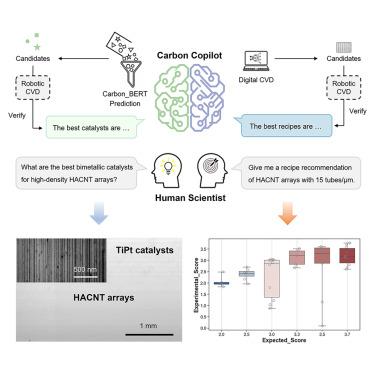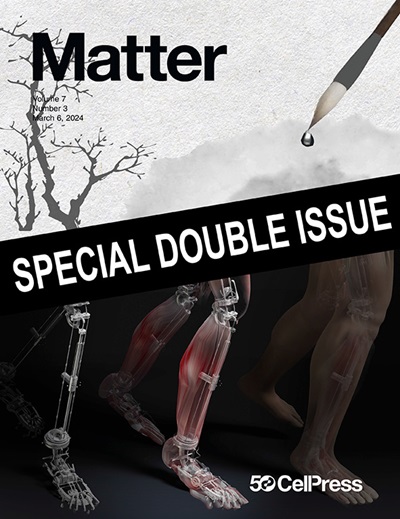Transforming the synthesis of carbon nanotubes with machine learning models and automation
IF 17.3
1区 材料科学
Q1 MATERIALS SCIENCE, MULTIDISCIPLINARY
引用次数: 0
Abstract
Carbon-based nanomaterials (CBNs) hold immense promise in electronics, energy, and mechanics. However, their practical applications face synthesis challenges stemming from complexities in structural control, large-area uniformity, and consistency, unaddressed by current research methodologies. Here, we introduce carbon copilot (CARCO), an artificial intelligence (AI)-driven platform that integrates transformer-based language models, robotic chemical vapor deposition (CVD), and data-driven machine learning models. Employing CARCO, we discovered a novel titanium-platinum bimetallic catalyst for high-density horizontally aligned carbon nanotube (HACNT) array synthesis, outperforming traditional catalysts. Furthermore, leveraging millions of virtual experiments, we achieved an unprecedented 56.25% precision in synthesizing predetermined densities of HACNT arrays. All were accomplished within just 43 days. This work not only advances the field of CBNs but also exemplifies the integration of AI with human expertise to overcome the limitations of traditional experimental approaches, marking a paradigm shift in nanomaterials research and paving the way for broader applications.


用机器学习模型和自动化改变碳纳米管的合成
碳基纳米材料(cbn)在电子、能源和机械领域有着巨大的前景。然而,由于结构控制、大面积均匀性和一致性的复杂性,它们的实际应用面临着当前研究方法未解决的综合挑战。在这里,我们介绍碳副驾驶(CARCO),这是一个人工智能(AI)驱动的平台,它集成了基于变压器的语言模型、机器人化学气相沉积(CVD)和数据驱动的机器学习模型。利用CARCO,我们发现了一种新型的钛-铂双金属催化剂,用于高密度水平排列碳纳米管(HACNT)阵列的合成,其性能优于传统催化剂。此外,利用数百万个虚拟实验,我们在合成预定密度的HACNT阵列方面达到了前所未有的56.25%的精度。所有这些都在43天内完成。这项工作不仅推动了神经网络领域的发展,而且体现了人工智能与人类专业知识的结合,克服了传统实验方法的局限性,标志着纳米材料研究的范式转变,为更广泛的应用铺平了道路。
本文章由计算机程序翻译,如有差异,请以英文原文为准。
求助全文
约1分钟内获得全文
求助全文
来源期刊

Matter
MATERIALS SCIENCE, MULTIDISCIPLINARY-
CiteScore
26.30
自引率
2.60%
发文量
367
期刊介绍:
Matter, a monthly journal affiliated with Cell, spans the broad field of materials science from nano to macro levels,covering fundamentals to applications. Embracing groundbreaking technologies,it includes full-length research articles,reviews, perspectives,previews, opinions, personnel stories, and general editorial content.
Matter aims to be the primary resource for researchers in academia and industry, inspiring the next generation of materials scientists.
 求助内容:
求助内容: 应助结果提醒方式:
应助结果提醒方式:


